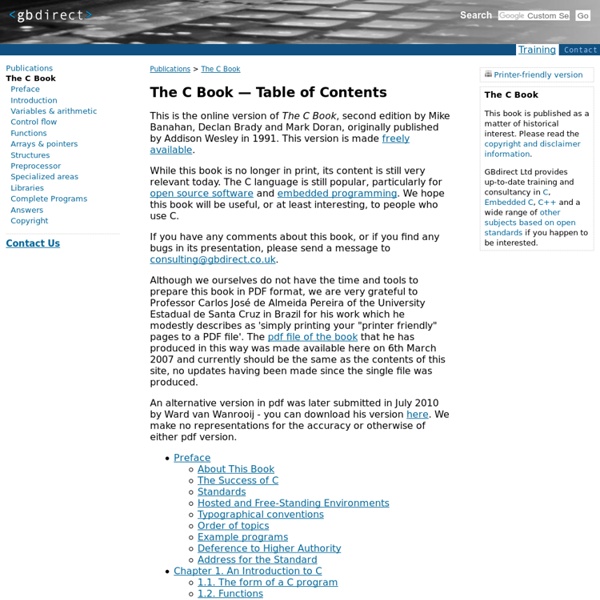Hadrian
Hadrian (Latin: Publius Aelius Hadrianus Augustus[note 1][2][note 2] 24 January, 76 AD – 10 July, 138 AD) was Roman Emperor from 117 to 138. In Latin, the full imperial title of Hadrian was also rendered as Tito Ael[io] Hadriano, just as it appears in ancient epigraphic records.[3] He re-built the Pantheon and constructed the Temple of Venus and Roma. He is also known for building Hadrian's Wall, which marked the northern limit of Roman Britain. Hadrian was regarded by some as a humanist and was philhellene in most of his tastes. He is regarded as one of the Five Good Emperors.
C++ Reference
This website uses cookies. By continuing, you give permission to deploy cookies, as detailed in our privacy policy. ok Search: Reference Not logged in Reference
Graphical vi-vim Cheat Sheet and Tutorial
Learning vi or vim is not easy. But it doesn't have to be that difficult, either. It is, in any case, faster, more powerful, and more productive than editing with any other editor, so you would do very well in investing the time and effort to learn it. Being a vi lover myself, I came up with the idea of providing a graphical cheat sheet for those learning vi or vim, and I also found out it was a very good way to structure a tutorial. Here are the results for your learning enjoyment (or your colleagues'). By the way, I recently published the definitive article explaining why vi/vim editing is so much better than regular editing.
Artificial intelligence
AI research is highly technical and specialized, and is deeply divided into subfields that often fail to communicate with each other.[5] Some of the division is due to social and cultural factors: subfields have grown up around particular institutions and the work of individual researchers. AI research is also divided by several technical issues. Some subfields focus on the solution of specific problems. Others focus on one of several possible approaches or on the use of a particular tool or towards the accomplishment of particular applications. The central problems (or goals) of AI research include reasoning, knowledge, planning, learning, natural language processing (communication), perception and the ability to move and manipulate objects.[6] General intelligence is still among the field's long-term goals.[7] Currently popular approaches include statistical methods, computational intelligence and traditional symbolic AI.
C-Programmierung
C-Programmierung Aus Wikibooks Wechseln zu: Navigation, Suche Tutorial / Einsteigerkurs in das Programmieren mit ANSI C Inhaltsverzeichnis[Bearbeiten] Vorwort
MAKE: Blog: Make a Skype Phone
Awhile back I made a Skype Payphone- now someone has made a more practical one that will fit on a desk nicely and can go mobile. Here’s a how-to on making a Skype phone out of an old cordless phone. I like how the author figured out which leads to tap in to [via] Link.
Alan Turing
Alan Mathison Turing, OBE, FRS (/ˈtjʊərɪŋ/ TEWR-ing; 23 June 1912 – 7 June 1954) was a British mathematician, logician, cryptanalyst, philosopher, pioneering computer scientist, mathematical biologist, and marathon and ultra distance runner. He was highly influential in the development of computer science, providing a formalisation of the concepts of "algorithm" and "computation" with the Turing machine, which can be considered a model of a general purpose computer.[2][3][4] Turing is widely considered to be the father of theoretical computer science and artificial intelligence.[5] During World War II, Turing worked for the Government Code and Cypher School (GC&CS) at Bletchley Park, Britain's codebreaking centre. For a time he led Hut 8, the section responsible for German naval cryptanalysis.
Objective-C und das Cocoa-Framework
Mac OS X und iPhone Entwicklung Anmerkung von Nicolas Hollmann[Bearbeiten] Als ich dieses Wikibook zum ersten mal am 25.02.2011 gesehen habe, war es schon verwaist.
Building a World Class Home Distillation Apparatus - Table of Contents
Since you've come this far, it's a good sign that you are at least a little serious about building a still. Hopefully, the information in this guide will be useful to you in traveling along that trail. To help you along the way, the major topics of the guide are linked in the table of contents at the left or, if you prefer, you can sequence through pages of the manual with the back and next buttons at the bottom of each page. For those of you who would prefer to browse through this guide off line, a hardcopy of the guide is available in both Microsoft Word® (.doc) and Adobe® Portable Data Format (PDF). The largest of these files is about 3.3 MB and will take about 30 minutes to download with a 28.8 KB connection. So please be patient if you elect to download this data.
Iptables command
From DD-WRT Wiki (Redirected from Iptables) You are here: DD-WRT wiki mainpage / Scripting / SSH/Telnet & The CLI / iptables Iptables is a powerful administration tool for IPv4 packet filtering and NAT. It is used to set up, maintain, and inspect the tables of IP packet filter rules in the Linux kernel. Iptables commands can be entered by command line interface, and/or saved as a Firewall script in the dd-wrt Administration panel.
QuickRef.org - all your docs are belong to us - PHP, Perl, CSS, HTML, Java, JavaScript, MySQL, Ruby, Python, and more



